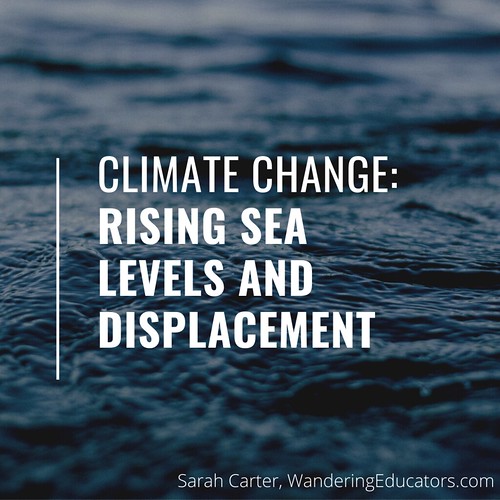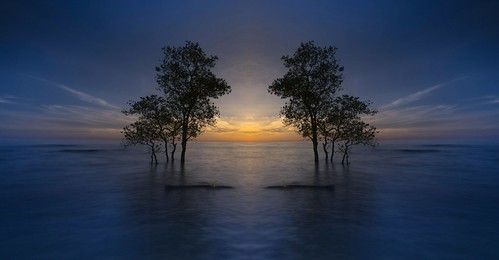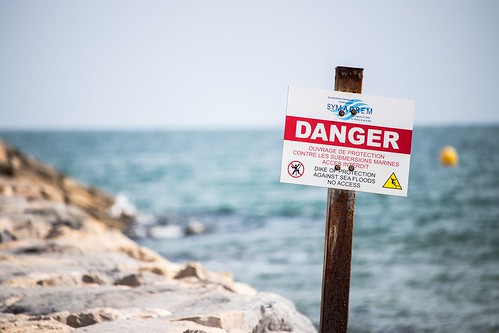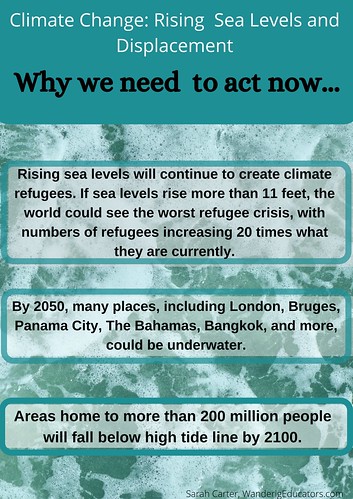In 2020, a concerning new record high in the global mean sea level was documented. i An increase in approximately 8-9 inches since 1880 was recorded; over a third of this increase has happened within the last two decades. ii Sea levels are continuing to rise and at an alarming rate, jeopardising the lives and livelihood of many human beings.

Those who live on small islands, and within close proximity to our oceans, face the highest risk of losing their homes because of rising sea levels. It is not just houses and infrastructure that will be lost; entire regions, cultures, and languages all face extinction. By forcing people to flee their homes, climate change is creating more and more refugees and stateless individuals. iii

Human beings are the main cause of global warming and—as we know—this has adverse effects on our global environment. While the world is continuously heating up, glaciers and other land-based ice are melting rapidly which then fill up our oceans. iv As well this, when oceans become warmer—because of global warming—their volumes increase. v This is called thermal expansion, and is a primary contributor towards rising sea levels.
This piece will look at the plight of people who face displacement because of rising sea levels as a result of climate change. It will shed light on nations, such as Kiribati vi, that will face extinction in the near future. I will also discuss the pressing human rights concerns of individuals within these nations.

Kiribati – ‘A Drowning Paradise’
Kiribati is predicted to be the first nation that falls victim to rising sea levels. vii Situated in the Pacific Ocean, it is a nation made up of 33 islands. Despite its isolation from the rest of the world, Kiribati is suffering some of the worst consequences, globally, from climate change.

Kiribati’s climate vulnerability is primarily due to how shallow the islands are in comparison to sea level. ‘The highest point on many of the islands such as South Tarawa is just a couple metres above sea level.’ viii This makes Kiribati vulnerable to rising sea levels because predictions indicate that, as a nation, they will soon be completely under water. Specifically, the Intergovernmental Panel on Climate Change (IPCC) has stated that by 2100, sea levels will have risen by approximately a metre, if not more. ix This highlights the threatening impact that climate change is having on the future of Kiribati...moreover, whether there will be any future.
Let’s take a closer look at the faces of those who are fighting for survival in Kiribati.
Life in Kiribati largely depends on water. The ocean that surrounds the islands is Kiribatians’ main source of food and water. However, our collective actions all over the world are causing huge tides and sea incursions to pollute their sources of fresh water and food. x This is putting Kiribatians in immediate danger, many of whom have already fled, as they believe their plight is unavoidable. Others stay, holding onto any remaining hope that they can save their land. xi However, this hope is reliant on ‘temporary solutions: residents have begun building walls out of coral rock which are then destroyed by the high tide.’ xii Due to Kiribati’s position as one of the world’s least developed countries (economically), other than make-shift infrastructure, they do not have much else to protect themselves from the devastating effects of climate change. xiii

While climate change is a global emergency that is consistently worsened by the actions of human beings, it must be recognised that countries that are suffering the most, like Kiribati, have contributed perhaps the least to climate change. In fact, ‘Kiribati is responsible for just 0.6% of world greenhouse gas emissions.’ xiv At the opposite end, in 2019, China was responsible for 27% of global greenhouse gas emissions, and faces very low risks from rising sea levels in comparison to Kiribati. xv
This is a prime example of the disproportionate effects of climate change and how the world’s most vulnerable people are suffering the most as a result of our actions. These unequal effects are only set to get worse. We need policies that support the most vulnerable and stop the biggest culprits. By looking at the Kiribatians’ desperate situation through a human rights lens, we can only begin to understand how climate change is violating the rights that they have as human beings. These rights were made to be universal, meaning every human is deserving of them. To uphold universal human rights, we must respect, protect, and fulfil the rights of everyone.
It is our duty as human beings to stop climate change destroying the livelihoods of entire nations, like Kiribati.
What Does This Mean For Human Rights?
While Kiribati is set to be the first nation that will fall victim to rising sea levels, it will not be the last. This is an upcoming global crisis that is causing severe ramifications for international human rights. Climate change is increasingly forcing people to become stateless and refugees. Despite this, international law does not yet recognise those on the frontlines of climate change ‘as an identifiable group whose rights are expressly articulated, or as a formal legal category of people in need of special protection.’ xvi This means that–legally–the international community can deny the protection of these individuals' human rights.
What does Statelessness mean?
International law defines statelessness as “a person who is not considered as a national by any State under the operation law.” xvii

Being stateless means having no government to ensure that your human rights are respected, protected, and fulfilled. This is because states are the main duty bearers for human rights. They provide the ‘basic rights such as education, healthcare, employment, and freedom of movement.’ xviii Therefore, without a state it becomes difficult to be able to claim these rights.
Rising sea levels cause individuals to become stateless by destroying whole nations, leaving whole nationalities without a place to call home. This affects their ability to claim civil and political rights, as well as economic, social, and cultural rights, all of which are fundamental for human beings to live a fair, dignified, and respected life.


Can you imagine if your nation disappeared? If you were forced to flee your home country and adapt to new and different culture? Perhaps you’d have to learn a new language, or act in accordance with a culture that you don’t feel comfortable in. You couldn’t continue going to the school that you grew up in, or live in your family home, or find comfort in your own unique practices. But you have no choice, because the place you used to call home has submerged into the sea as a result of human beings' negligence towards our planet.
Being stateless is perhaps one of the most vulnerable and dangerous positions that any human being can be in. This is primarily because it is a position that allows human rights to be abused. We must stop climate change from forcing whole nations to become stateless. It might not affect you now, but sea levels are continuing to rise and without action, many more cities, nations, and countries will be eradicated by the effects of climate change.
Climate Refugees
‘Climate refugee’ refers to a person who has crossed an international border due to a well-founded fear of the effects of climate change. It is not a term that is recognised by international law or the United Nations High Commissioner for Refugees (UNHCR). xix The term that is more commonly used is ‘persons displaced in the context of disasters and climate change.’ xx This is because people tend to become internally displaced before they cross international borders.
‘Since 2008, an average of 24 million people have been displaced by catastrophic weather disasters each year.’ xxi This number is set to increase with the worsening effects of climate change.

Not only this, but with rising sea levels increasingly becoming one of the worst effects of climate change due to its ability to destroy whole nations, more and more people will be forced to flee their homes and take refuge in other nations. This means that the term climate refugee needs recognition within international law so that these people receive the protection that they need.
Progress? The Case of Ioane Teitota
In 2015, Ioane Teitota, a national from Kiribati, made an official complaint to the United Nations after being deported from New Zealand. He had recently moved there after declaring that the effects of climate change had made his home nation unfit to live in, but faced violations of his right to life when New Zealand denied his asylum application. xxii
Developments since then have seen the UN Human Rights Committee determine ‘that countries cannot deport people who have sought asylum due to climate-related threats.’ xxiii This ruling seems to understand the unpredictable and destructive nature of climate change. It highlights how the international community must continue to do better to help protect the human rights of individuals who face the consequences of our collective actions, as well as hold states accountable for their actions.
However, this is just one successful case amongst numerous unsuccessful. While it highlights a positive step in the right direction, the number of people who will become stateless and refugees because of climate change is set to increase.
We Need More Progress!
The international community is made up of each and every nation. Therefore, the responsibility to stop the increasing devastation cause by climate change falls on us. We must do more to stop global warming contributing to rising sea levels. We must do more to protect international human rights. And we must do more to stop climate change robbing us of our ability to live as equal beings on this earth.
If we don’t act now, the effects of climate change are going to continue; only more fatal and on a much larger scale.

Climate Change articles in this series:
Linking Human Rights and Climate Change
Climate Change and Inequality: Does Climate Change Discriminate?
All You Need To Know About COP26

Sarah Carter is the Human Rights and Climate Change Editor at Wandering Educators. She is currently studying a Master’s in Human Rights and Diplomacy at the University of Stirling. She is motivated by a desire to make a change in this world.
End notes:
i Rebecca Lindsey ‘Climate Change: Global Sea Level’ (climate.gov 2021) < https://www.climate.gov/news-features/understanding-climate/climate-change-global-sea-level > accessed 14 October 2021
ii ibid
iii ‘Climate Change and Disaster Displacement’ (UNHCR) < https://www.unhcr.org/uk/climate-change-and-disasters.html > accessed 18 October 2021
iv ‘Is sea level rising?’ (National Ocean Service 2021) < https://oceanservice.noaa.gov/facts/sealevel.html > accessed 14 October 2021
v Laurent Cousineau ‘Thermal Expansion Definition’ (Climate Change Guide 2021) < https://www.climate-change-guide.com/thermal-expansion-definition.html > accessed 14 October 2021
vi ‘Kiribati: A Drowning Paradise in the South Pacific| DW Documentary (YouTube 2017) < https://www.youtube.com/watch?v=TZ0j6kr4ZJ0 accessed 18 October 2021
vii ‘Kiribati, the first country rising sea levels will swallow up as a result of climate change’ (Iberdrola 2021) < https://www.iberdrola.com/environment/kiribati-climate-change > accessed 18 October 2021
viii Mike Bowers ‘Waiting for the tide to turn: Kiribati’s fight for survival’ The Guardian (London, 23 October 2017) https://www.theguardian.com/world/2017/oct/23/waiting-for-the-tide-to-turn-kiribatis-fight-for-survival accessed 18 October 2021
ix ‘New study warns that sea levels will rise faster than expected’ (Mongabay 2021) < https://news.mongabay.com/2021/02/new-study-warns-that-sea-levels-will-rise-faster-than-expected/ > accessed 19 October
x Ibid
xi ‘Kiribati, the first country rising sea levels will swallow up as a result of climate change’ (Iberdrola 2021) < https://www.iberdrola.com/environment/kiribati-climate-change > accessed 18 October 2021
xii ibid
xiii ibid
xiv ibid
xv Kate Larsen, Hannah Pitt, Mikhail Grant, and Trevor Houser ‘China’s Greenhouse Gas Emissions Exceeded the Developed World for the First Time in 2019’ (Rhodium Group 2021) < https://rhg.com/research/chinas-emissions-surpass-developed-countries/ > accessed 18 October 2021
xvi Ben Saul ‘An Insecure Climate for Human Security? Climate-Induced Displacement and International Law’ (2008) Legal Studies Research Paper 08/131 < https://papers.ssrn.com/sol3/papers.cfm?abstract_id=1718865 > accessed 22 October 2021
xvii ‘About statelessness’ (UNHCR) < https://www.unhcr.org/ibelong/about-statelessness/ > accessed 22 October 2021
xviii ‘Ending Statelessness’ (UNHCR) < https://www.unhcr.org/uk/ending-statelessness.html > accessed 22 October
xix ‘What We Do’ (Climate Refugees) < https://www.climate-refugees.org/foundingvision > accessed 22 October 2021
xx ‘Climate Change and disaster displacement’ (UNHCR) < https://www.unhcr.org/uk/climate-change-and-disasters.html >
xxi Tim McDonnell ‘The Refugees the World Barely Pays Attention to’ (NPR 2018) < https://www.npr.org/sections/goatsandsoda/2018/06/20/621782275/the-refugees-that-the-world-barely-pays-attention-to > accessed 22 October 2021
xxii ‘UN human rights ruling could boost climate change asylum claims’ (UN News 2020) https://news.un.org/en/story/2020/01/1055671 accessed 22 October 2021
xxiii Ibid
Fact 1: Joe Carthy ‘6 Potential Consequences of Catastrohpic Sea Level Rise’ (Global Citizen 2017) < https://www.globalcitizen.org/en/content/6-things-happen-sea-level-rise/ > 27 October 2021
Fact 2: ‘Incredible places that will be underwater by 2050’ (LoveExploring 2020) < https://www.loveexploring.com/gallerylist/91927/incredible-places-that-will-be-underwater-by-2050 > accessed 27 October 2021
Fact 3: ‘Report: Flooded Future: Global vulnerability to sea level rise worse than previously understood’ (Climate Central 2019) < https://www.climatecentral.org/news/report-flooded-future-global-vulnerability-to-sea-level-rise-worse-than-previously-understood > accessed 27 October 2021


